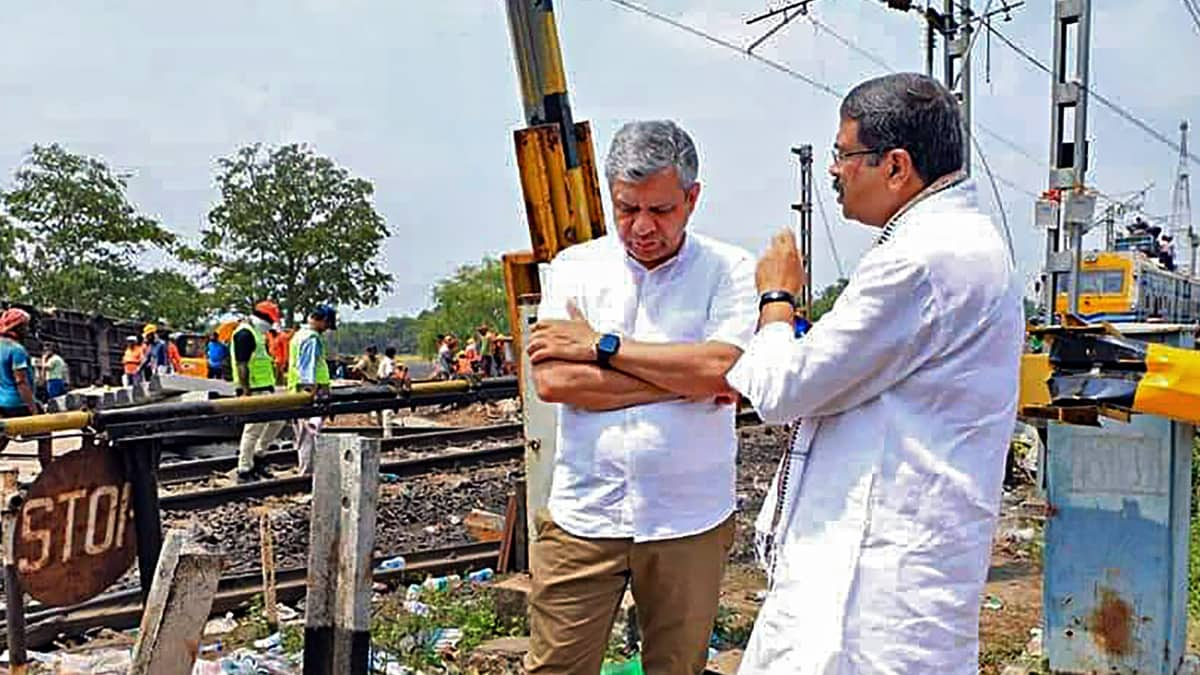
Railway Minister Ashwini Vaishnaw with Union Minister Dharmendra Pradhan oversees restoration work at the site of the Odisha train accident in Balasore district. (PTI)
BJP understands that if it succumbs to constant opposition pressure, it could end up looking like the UPA. Second, it would embolden those who, before 2024 polls, want to call the present regime corrupt
In 2015, as demands grew from the Congress for the resignation of Sushma Swaraj as external affairs minister on grounds of her alleged proximity to former IPL chief Lalit Modi, Rajnath Singh stepped in and said: “This is not the UPA government, she won’t resign.” And Swaraj never did.
After this, in an interview then to CNN-News18, senior Congress leader Ashok Chavan — who himself had to step down over the Adarsh scam — had said: “The biggest mistake we made was to succumb to the media trial as well as BJP’s pressure when they were in Opposition. It made us look guilty when we were not.”
The list of UPA ministers who resigned on moral grounds was long — Pawan Bansal, Dayanidhi Maran, Shashi Tharoor, and Ashwani Kumar. In private, they protested as they pointed out that this was being done under the then-Opposition’s pressure and they were not guilty. The Congress acknowledged later that it was mistake as it made the situation look like an admission of guilt, which added to the narrative built by Prime Minister Narendra Modi in 2014 — which continues till now — that the UPA government was soaked in corruption.
The BJP has learnt from its rival’s mistake. Despite pressure from the Opposition, at times united, it has refused to buckle under the burden, brazening it out and giving ‘proof’ that its ministers were above board.
For instance, Nirmala Sitharaman, despite Rafale allegations, stood her ground and the BJP was vindicated by the Supreme Court verdict. Similar has been the case with others like S Jaishankar, Rajnath Singh and Amit Shah. The latest case is of Railways Minister Ashwini Vaishnaw, with the Congress and most of opposition demanding his head post the Balasore train accident.
Amidst opposition pressure, BJP’s Amit Malviya said: “This is no time to politicise. There have been many cases when during the tenure of Mamata Banerjee, Nitish Kumar and Lalu Prasad there have been casualties and derailments but they never stepped down.”
The strategy in the BJP has been that even if they want to remove a minister, they take their time. It is usually never done under any pressure. The only exception was that of MoS External Affairs MJ Akbar.
The reason is simple. One, BJP understands that if it succumbs to constant opposition pressure, it could end up looking like the UPA. Second, it would embolden those who, before 2024 polls, want to call the present regime corrupt.
The BJP’s top leadership is aware that if at all a resignation is inevitable, it will be done at its pace rather than timed with Opposition demand. “The idea is to make it look like the decision was taken by the prime minister and not the Opposition.”
In the case of Vaishnaw, BJP doesn’t see any logic in his resignation. With the CBI probe looking at a possible sabotage angle, there is reprieve. And no matter how much the outcry, the BJP believes that the best damage control would be to learn the lesson and improve rather than make a minister resign.




